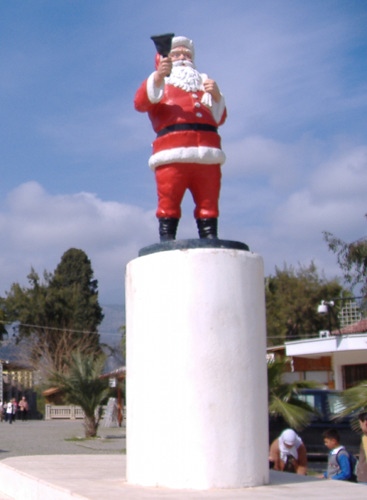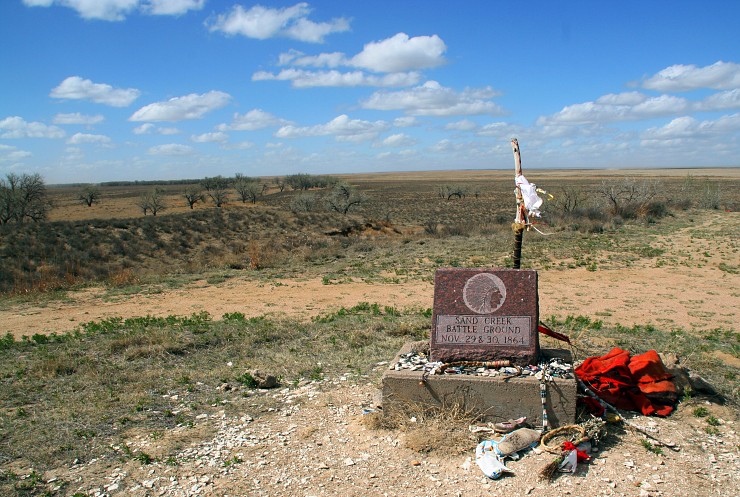 I joined the rest of the delegates of the Rocky Mountain Annual Conference today in a pilgrimage to the site of the Sand Creek Massacre near Eads, CO. It was a long journey out there by bus and I’m guessing that a visit from 600 Methodists likely caused a major spike in the remote National Historic Site’s average visitation numbers for the year.
I joined the rest of the delegates of the Rocky Mountain Annual Conference today in a pilgrimage to the site of the Sand Creek Massacre near Eads, CO. It was a long journey out there by bus and I’m guessing that a visit from 600 Methodists likely caused a major spike in the remote National Historic Site’s average visitation numbers for the year.
The Sand Creek site represents one of those interesting phenomena in the study of history—a place that is virtually “in the middle of nowhere” but is invested with sacredness due to what happened there. Of course, no place is truly remote and desolate if God is there, and God was certainly there today as we walked along the ridges, felt the hot wind in our faces, and heard the loud silence of a place where so many needlessly lost their lives while others seemed to lose their humanity. No monument is truly necessary at Sand Creek as it is in so many other sites. The land itself seems to speak its story.

I walked out on the long ridge that borders the western side of the site, remembering that this was the place where part of Chivington’s command drove off the village’s pony herd while the main force came out from behind bluff to the east and began firing into the village with no warning. It’s basic military tactics—seize the high ground and then use the downward momentum to drive into the enemy. In this case, however, the “enemy” was no enemy at all. The tribes had intentionally set up in the bottomland of the surrounding bluffs—a posture of peace and sign that no conflict was expected.
It’s hard to imagine what went wrong in the hearts and minds of many of the men in Chivington’s command that day. Ms. Little Coyote, who was on our bus today, told of the atrocities committed on the bodies of her people that day, with many parts of the dead taken away and displayed as trophies. While it’s rare that the conduct of war offers much moral high ground on which to stand, the horrific, deliberate, and destructive actions that took place on that day insured that any high ground taken by Chivington and his rampaging men would be disparaged forever in the memories of those whose people were lost that day and in the hearts of those who now stand on those bluffs and gaze into the now empty prairie.
The company commanders who ordered their troops to stay in formation and not engage did take the moral high ground that day. Their non-action is a study in contrasts. I heard the reverence in the voices of our tribal hosts today for those who refused to treat peaceful people as the enemy. We most often think of great warriors as those who earn the Congressional Medal of Honor, as the great bronze statues of Pueblo’s winners of the nation’s highest award witness to outside the convention hall where we boarded the busses this morning. Sometimes, however, the best high ground one can achieve is to refuse to join in the violence and do the right thing regardless of the cost and the risk to one’s personal safety. Captain Silas Soule would later be gunned down on a Denver street for refusing to fire on innocent men, women, and children, illustrating the difficulty of standing on that high ground alone.

Of course, that’s the same high ground to which we Christians—United Methodist or otherwise—are called. We serve a Savior who was crucified on some high ground outside of Jerusalem for refusing to engage in the violence of revolution and for critiquing the moral superiority of a pharisaic “us” vs. “them” worldview. The one who could have called on companies of angels to sweep down upon his enemies chose to love and forgive them instead.
The visit to Sand Creek reminds me that we who follow Christ need to continue to hold that high ground in the midst of a world that is quick to dehumanize, quick to violence, and quick to put the innocent in jeopardy. Colonel Chivington, a Methodist elder, had received that same call at his ordination but failed to uphold it. As we ordain new elders and deacons on Sunday, and as clergy and lay people in the Rocky Mountain Annual Conference remember the vows we took as members and leaders, we must continue to remind each other that the only high ground that matters for us is that which holds the cross, and the only commands we must follow are those of the one who came to save all of God’s children.



